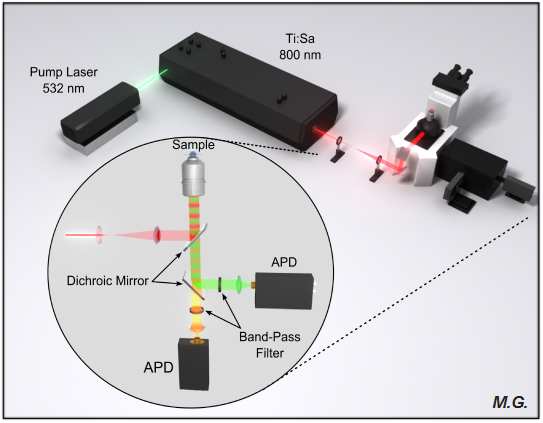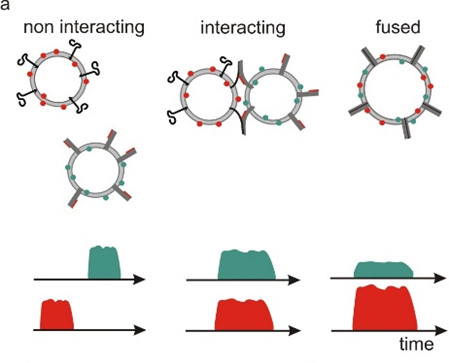Membrane fusion is pivotal in many processes like synaptic signal transmission but also membrane trafficking, viral entry or fertilization. These processes are regulated by various proteins with SNARES (soluble N-ethylmaleimide-sensitive factor attachment protein receptors) being very important catalysts for this process. However, prior to fusion important intermediate states occur that are presumably decisive for the general regulation of membrane interactions. For example, pre-docked states exist in which the membranes are tethered by certain proteins but are not yet fused. Such states might be pivotal to allow for quick triggering of the actual fusion event.

In order to investigate the mechanism by which various types of proteins regulate docking and fusion assays are necessary that are able to distinguish non-interacting membranes from docked and fused states. To this end, liposome model systems are particular useful as they allow to selectively investigate the different roles of individual key players reconstituted into two different sets of liposomes representing the two interacting membranes. Therefore, we have developed a liposome assay based on single liposome detection, two-photon two-color fluorescence cross-correlation spectroscopy and fluorescence lifetime measurements that allows to differentiate individual free, docked or fused liposomes or quantify the number of free, docked or fused liposomes in a confocal detection volume of a microscope set-up.

The assay is based on labelling the lipids of two different sets of liposomes with two different dyes. The two different sets of liposomes can contain different proteins, can have different lipid compositions and different membrane curvatures as differing diameters down to ~30 nm are possible. The two dyes can emit, for example, fluorescence in the red and green spectral range. In a two-photon excitation microscope an excitation wavelength can be selected that excites both dyes to approximately the same extend when liposomes diffuse through the excitation volume of about 200-300 nm in diameter. Non-interacting liposomes are detected as independent fluorescence signals in the red and green detector channel of the microscope set-up. If liposomes are docked or fused, the red and green fluorescence signals are detected in a correlated manner. In addition, if the liposomes are fused, Förster energy transfer occurs within the lipid bilayers leading to a reduction of the green fluorescence emission and an increase in the red fluorescence emission. In order to quantify the percentage of docked or fused liposomes diffusing through the detection volume two-photon, two-color fluorescence cross-correlation spectroscopy is applied. For robust determination of the degree of lipid mixing (fusion) in a sample, simultaneously the fluorescence lifetime of the donor molecules is recorded.

[1] A. Cypionka , A. Stein , J. M. Hernandez , H. Hippchen , R. Jahn , P. J. Walla "Discrimination between docking and fusion of liposomes reconstituted with neuronal SNARE-proteins using FCS", PNAS, 106, 44, 18575-18580 (2009).
[2] J. M. Hernandez, A. Stein, E. Behrmann, D. Riedel, A. Cypionka, Z. Farsi, P. J. Walla, S. Raunser and R. Jahn,"Membrane Fusion Intermediates via Directional and Full Assembly of the SNARE Complex", Science, 336, 1581-1584 (2012).
[3] W. Vennekate, S. Schröder, C.-C. Lin, G. van den Bogaart, M. Grunwald, R. Jahn, P. J. Walla,"Cis- and trans-membrane interactions of synaptotagmin-1", PNAS, 109, 11037-11042 (2012).
[4] C.-C. Lin, H.-F. Hsu, P.J. Walla, " A One Donor-Two Acceptor Lipid Bilayer FRET Assay Based on Asymmetrically Labeled Liposomes " J. Phys. Chem. B. , accepted (2016)
Research Groups
Hohm Group
Jacob Group
Kozuch Group
Maul Group
Proppe Group
Tschierlei Group
Walla Group
Associated Groups
Muñoz Group (GRS)
Emeriti
Becker Group
Gericke Group
Personnel
Institute Director
Executive Board
Staff
Facilities
Workshop
School lab (G)
Agnes Pockels lab
Documents
Institute Rules (G)
Operation Manuals
Laser safety
Emergency leaflet
Campus Map (G)
Events Calendar (G)
TU Public Announcements
Whistle Blowing (G)
Ticket GITZ (G)
Ticket Facilities Management (G)
Energy Web Portal (G)
(G) German only
